Part 2 of a previous post. To read Part 1, click here.
So what can we do? What can we do when we find ourself sailing into the four C’s, becoming Critics, Comedians, Commentators, and Cynics?
 We must set a new course. We must turn around and sail in a different direction, sail towards the Son. As we sail closer and closer and soak up His warmth, we find ourselves transforming, turning into something new. We are no longer pillaging pirates and marauding conquistadors, eager to fill our empty chests with whatever we can grab. We are metamorphosing into merchant travelers and missionary adventurers, traveling across stormy seas and along the strait pass to bring goods to those in need. Instead of thinking about what we can take, we consider what we can contribute. And so we offer:
We must set a new course. We must turn around and sail in a different direction, sail towards the Son. As we sail closer and closer and soak up His warmth, we find ourselves transforming, turning into something new. We are no longer pillaging pirates and marauding conquistadors, eager to fill our empty chests with whatever we can grab. We are metamorphosing into merchant travelers and missionary adventurers, traveling across stormy seas and along the strait pass to bring goods to those in need. Instead of thinking about what we can take, we consider what we can contribute. And so we offer:
Compliments, instead of Criticisms
 There is a place for criticism. There is literary criticism, historical criticism, biblical criticism. There are film critics and peer-reviewers and instructors who can give feedback to their students. Criticism is about improving work or performance– but life is not all about performance or work. As you stand in a group of friends, sharing life updates, and someone accidentally says a word incorrectly, do you need to correct them? Is it necessary? When you are at church and the band was a bit off tune for one of the songs, is it necessary to criticize them? Too often a criticism is simply a complaint in fancy dress. Yes, you want people to be correct and do their best, but in most cases, that is what they want too– and they are working on it. (And yes, perhaps there are times you need to offer criticism– but our tendency should lean towards consideration [Do they need this?] not automatic criticism.) I’ll share JB Philips translation of 1 Thessalonians 5:11-15.
There is a place for criticism. There is literary criticism, historical criticism, biblical criticism. There are film critics and peer-reviewers and instructors who can give feedback to their students. Criticism is about improving work or performance– but life is not all about performance or work. As you stand in a group of friends, sharing life updates, and someone accidentally says a word incorrectly, do you need to correct them? Is it necessary? When you are at church and the band was a bit off tune for one of the songs, is it necessary to criticize them? Too often a criticism is simply a complaint in fancy dress. Yes, you want people to be correct and do their best, but in most cases, that is what they want too– and they are working on it. (And yes, perhaps there are times you need to offer criticism– but our tendency should lean towards consideration [Do they need this?] not automatic criticism.) I’ll share JB Philips translation of 1 Thessalonians 5:11-15.
So go on cheering and strengthening each other with thoughts like these, as I have no doubt you have been doing. We ask you too, my brothers, to get to know those who work so hard among you. They are your spiritual leaders to keep you on the right path. Because of this high task of theirs, hold them in highest honour. Live together in peace, and our instruction to this end is to reprimand the unruly, encourage the timid, help the weak and be very patient with all men. Be sure that no one repays a bad turn by a bad turn; good should be your objective always, among yourselves and in the world at large. (Emphasis mine)
Definitions of “criticism” use terms like “analysis” and “judgment” and “faults” and “merits.” Most criticism involves a type of “stripping away” (even if it’s supposed to be “constructive” criticism)– and that’s something that needs to be left to experts or those who are closest to us. It’s an intimate affair to offer constructive criticism, yet we try to rush the relationship and assume that we have the authority and trust to speak into someone’s life– whether we do or not.
 But compliments can complement (literally “complete”) someone– it is addition instead of subtraction. Instead of always offering criticism, which focuses on the appearances and performance of others, we can contribute words of kindness that fill another person up. I’m not talking about flattery or insincere praise– but true recognition of a person’s value, beauty, and significance. True compliments are a grace, freely given. There is always something good to say about another person. And if you just can’t think of something good, follow that old saying– “If you don’t have something nice to say, don’t say anything at all.” And if you have nothing kind to say, you might need to do some soul searching.
But compliments can complement (literally “complete”) someone– it is addition instead of subtraction. Instead of always offering criticism, which focuses on the appearances and performance of others, we can contribute words of kindness that fill another person up. I’m not talking about flattery or insincere praise– but true recognition of a person’s value, beauty, and significance. True compliments are a grace, freely given. There is always something good to say about another person. And if you just can’t think of something good, follow that old saying– “If you don’t have something nice to say, don’t say anything at all.” And if you have nothing kind to say, you might need to do some soul searching.
Compassion, instead of Comedy
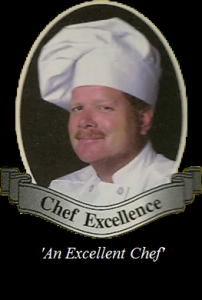 So much of comedy is objectification. It turns a situation, a conversation, a person into a “thing”– something for people can enjoy. The comedian is truly a chef of life– they take personal experiences, add a dash of witty observations, cook it in an oven of personality and style, and present to a roomful of pleased customers. It’s one thing to joke about airplane food– it’s another to joke about the stewardess. I’m not saying that comedians should never joke about other people– I’m no Humor Nazi! (No Jokes For You! [And with that I joined the comedy club by turning a figure or group of people into an object of humor.]) But once again CS Lewis (basically my co-author) reminds us in The Weight of Glory:
So much of comedy is objectification. It turns a situation, a conversation, a person into a “thing”– something for people can enjoy. The comedian is truly a chef of life– they take personal experiences, add a dash of witty observations, cook it in an oven of personality and style, and present to a roomful of pleased customers. It’s one thing to joke about airplane food– it’s another to joke about the stewardess. I’m not saying that comedians should never joke about other people– I’m no Humor Nazi! (No Jokes For You! [And with that I joined the comedy club by turning a figure or group of people into an object of humor.]) But once again CS Lewis (basically my co-author) reminds us in The Weight of Glory:
There are no ordinary people. You have never talked to a mere mortal. Nations, cultures, arts, civilizations – these are mortal, and their life is to ours as the life of a gnat. But it is immortals whom we joke with, work with, marry, snub and exploit – immortal horrors or everlasting splendors. This does not mean that we are to be perpetually solemn. We must play. But our merriment must be of that kind (and it is, in fact, the merriest kind) which exists between people who have, from the outset, taken each other seriously – no flippancy, no superiority, no presumption.
 Thanks Jack. That’s exactly what I was trying to convey. We can still joke and laugh, but we must remember that no person is simply an object– but a human being with a soul. But ultimately I’m not even criticizing comedians– I’m trying to draw the line between the man on the stage and the family member on the couch or the teenager on Instagram or the co-worker in the office. The comedian knows his or her place and operates from that theater of influence– but too often we assume that we can be (and therefore should be) comedians 24/7, wherever we go. Yes, it’s fine to crack jokes. Yes, it’s okay to laugh. But when our jokes or laughter tears a person down or we are in a situation where we shouldn’t be making jokes, something is wrong.
Thanks Jack. That’s exactly what I was trying to convey. We can still joke and laugh, but we must remember that no person is simply an object– but a human being with a soul. But ultimately I’m not even criticizing comedians– I’m trying to draw the line between the man on the stage and the family member on the couch or the teenager on Instagram or the co-worker in the office. The comedian knows his or her place and operates from that theater of influence– but too often we assume that we can be (and therefore should be) comedians 24/7, wherever we go. Yes, it’s fine to crack jokes. Yes, it’s okay to laugh. But when our jokes or laughter tears a person down or we are in a situation where we shouldn’t be making jokes, something is wrong.
 Instead of offering a comedy performance in every interaction we have with others, we should contribute compassion. Compassion is to “suffer-with” another person. We enter into their world and see things from their point of view. The Point of View Gun is one of the most powerful weapons in the film version of Douglas Adam’s book, The Hitchhiker’s Guide to the Galaxy. You shoot it at someone and suddenly absorb their thoughts and feelings for a short time. Imagine if everyone was packing a Point of View Gun instead of a Zinger Pistol. The world would be a much kinder place.
Instead of offering a comedy performance in every interaction we have with others, we should contribute compassion. Compassion is to “suffer-with” another person. We enter into their world and see things from their point of view. The Point of View Gun is one of the most powerful weapons in the film version of Douglas Adam’s book, The Hitchhiker’s Guide to the Galaxy. You shoot it at someone and suddenly absorb their thoughts and feelings for a short time. Imagine if everyone was packing a Point of View Gun instead of a Zinger Pistol. The world would be a much kinder place.
But truly, sometimes the best jokes are the ones that come out of deep love, like old family stories or jokes between friends. There need not be a dichotomy between Humor and Love; instead, the line must be drawn between everyday life and the comedic stage. God created us to be Lovers, not Comedians. We certainly can be the latter if we want, but the former must always come first. Love always comes first.
Conversation, instead of Commentary
 Would you rather participate or sit on the sidelines? Certainly there is a time for one and a time for the other. At times I wish I could play a game, and at times I would rather just watch others play. At times I wish I could be the writer or speaker and teacher, and at times I’d rather be the reader, listener, or student. But relationships and life and adventure needs participation, engagement, give and take. And if you are simply making comments, you’re just watching life go by.
Would you rather participate or sit on the sidelines? Certainly there is a time for one and a time for the other. At times I wish I could play a game, and at times I would rather just watch others play. At times I wish I could be the writer or speaker and teacher, and at times I’d rather be the reader, listener, or student. But relationships and life and adventure needs participation, engagement, give and take. And if you are simply making comments, you’re just watching life go by.
Once again, technology helps us hurt ourselves. After all, if you see a beautiful sunrise, you can Tweet about it, write a blog post, Snapchat it, Instagram it (with your favorite filter), post something to Facebook, video your reaction and post it to YouTube or Vine or Facebook or Instagram or whatever new social media account will have risen up in the next 5 years. Gryzzl? Or… you could simply watch the sunrise. Be present. Engage. The same is true in relationships. Someone says something to you. You could comment on how they pronounced a word, change the subject to something more interesting, talk about how you love the way y’all talk about stuff– or you could just listen.
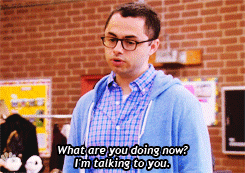
Be there.
Participate.
A funny example is from the TV show “Parks and Recreation.”
Morris complains to Donna about how she spoiled a movie by some of her tweets.
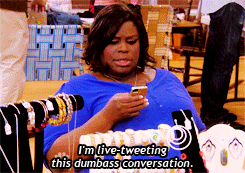 Then he notices that she is on her phone.
Then he notices that she is on her phone.
Sincerity, instead of Cynicism
It comes in many forms. Sarcasm. Snideness. Snark. Scoffing. Scorn. Pessimism. Negativity. Ridicule. Derision. Mockery. Sometimes it’s appropriate– like the comedian on the stage– but too often we feel its our part to deconstruct the world and steal the wonder from a person’s eyes.
I recently read this post by Rebecca Reynolds over at the Rabbit Room, and thought of it as I wrote the above section on criticism. In a review of Kenneth Branagh’s Cinderella, Rebecca writes:
The unflinching purity of this film is so rare that it made me uncomfortable at first, and then it made me ache, because I’m so starved for sincerity. I’ll admit that when the pumpkin turned into a carriage, I got a big knot in my throat, for pure wonder was being held out to me in two hands. A magical story was being told humbly, and I was being trusted to receive it with humility as well.
“Starved for sincerity.” A beautiful phrase. In a way, we’re all starved for sincerity. We all want truth, justice, honesty, authenticity. We want it in our products, in our communities, in our governments, in our relationships. And too often we fail to offer to others what we want ourselves.
I remember in high school that some of my friends always seemed to take pleasure in my “innocence” or “naiveté,” laughing when I didn’t know some innuendo or assumed the best in another person. Perhaps I was gullible. Perhaps. Or perhaps I held out hope. Recently a character in the show Community deconstructed the idea of hope, saying: “Oh God no, I never hope. Hope is pouting in advance. Hope is faith’s richer, bitchier sister. Hope is the deformed addict bound incest monster of entitlement and fear.” And while it’s funny, it’s also sad.
Cynicism sees the worst in people. It believes that it knows best and laughs at anyone who disagrees. It sees the glass half empty and reminds us “Half of the world has no access to water” and “The other half has no access to glasses.” It takes a sad song and makes it sadder. It does so in the name of truth and honesty and rawness, but really it’s just trying to take others down with it as it sinks into nihilism and existentialism.
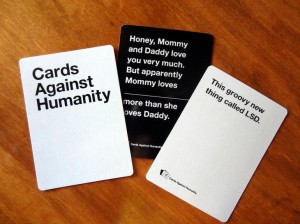 The game “Cards Against Humanity” is exactly that: against humanity. Sometimes it is fun and fine, but usually it’s just plain crude. It reduces us to the lowest levels of bawdy humor as we try to win points by playing cards with sexual euphemisms or irreverent images. And I take pleasure in it. I hate that I do, but I do. So when a friend of mine was coming to a party, I remarked that she needed to play the game, that it’s terrible but fun. So we played and laughed and had a ball. But I felt terrible all the same, like I tripped and fell into a muddy ditch and reached up to pull someone in with me.
The game “Cards Against Humanity” is exactly that: against humanity. Sometimes it is fun and fine, but usually it’s just plain crude. It reduces us to the lowest levels of bawdy humor as we try to win points by playing cards with sexual euphemisms or irreverent images. And I take pleasure in it. I hate that I do, but I do. So when a friend of mine was coming to a party, I remarked that she needed to play the game, that it’s terrible but fun. So we played and laughed and had a ball. But I felt terrible all the same, like I tripped and fell into a muddy ditch and reached up to pull someone in with me.
The synonym of cynicism is idealism– and I know that I tend to run that way if left unencumbered. So perhaps I need some realism now and then to ground me. But sometimes it grounds me down so much that all that’s left is Adam’s dust. So perhaps somewhere in between cynicism (seeing the worst) and idealism (seeing the best) is sincerity– seeing and presenting the truth.
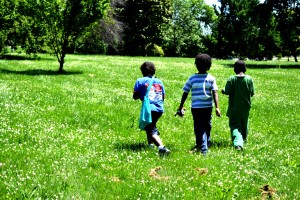
Sincerity is “the quality of being free from pretense, deceit, or hypocrisy.” Imagine a world where we were honest with each other, told each other what we liked about each other, shared our hopes and fears, bared our souls. Well, sorry, we don’t live in that world. But you can do your part to make a world within this world. Create worlds with your words, with your work, with your art, with your music, with your friendships, with your service, with your habits, with your money, with your time, with all you have. Create safe spaces and trusting communities where people can be sincere and meet on a level playing ground, without worrying about being pulled into the mud.
Now what?
 Repentance. It’s a term related to salvation, of course, but it can also be used elsewhere, with some imagination. A painter that realizes he picked a wrong color repents by sanding down his first attempt, then painting again with something new. A driver repents when he realizes he’s been going the wrong way, makes a U-turn, then heads back in the right direction. And we can all repent in our daily habits, routines, practices, attitudes, actions, words, and more. If we were honest with ourselves, we’d find that we should repent daily– if not hourly. Sometimes I’ve got to repent minute by minute. Good ole C.S. Lewis reminds us in Mere Christianity:
Repentance. It’s a term related to salvation, of course, but it can also be used elsewhere, with some imagination. A painter that realizes he picked a wrong color repents by sanding down his first attempt, then painting again with something new. A driver repents when he realizes he’s been going the wrong way, makes a U-turn, then heads back in the right direction. And we can all repent in our daily habits, routines, practices, attitudes, actions, words, and more. If we were honest with ourselves, we’d find that we should repent daily– if not hourly. Sometimes I’ve got to repent minute by minute. Good ole C.S. Lewis reminds us in Mere Christianity:
[Repentance] means unlearning all the self-conceit and self -will that we have been training ourselves into… It means killing part of yourself, under-going a kind of death.
 So we die. But when we die, we truly live. If see the error of our ways, it’s best if we start by asking for help– from family, from friends, from pastors or mentors or counselors, from the Holy Spirit above all. We receive new life and get moving again. We set a new course and sail into the Son. It’s hard, but it’s worth it. Like all things.
So we die. But when we die, we truly live. If see the error of our ways, it’s best if we start by asking for help– from family, from friends, from pastors or mentors or counselors, from the Holy Spirit above all. We receive new life and get moving again. We set a new course and sail into the Son. It’s hard, but it’s worth it. Like all things.
So today I’ll start with my cynicism. Perhaps things aren’t as bad as they appear. I’ll hold on to hope today.
What about you?

